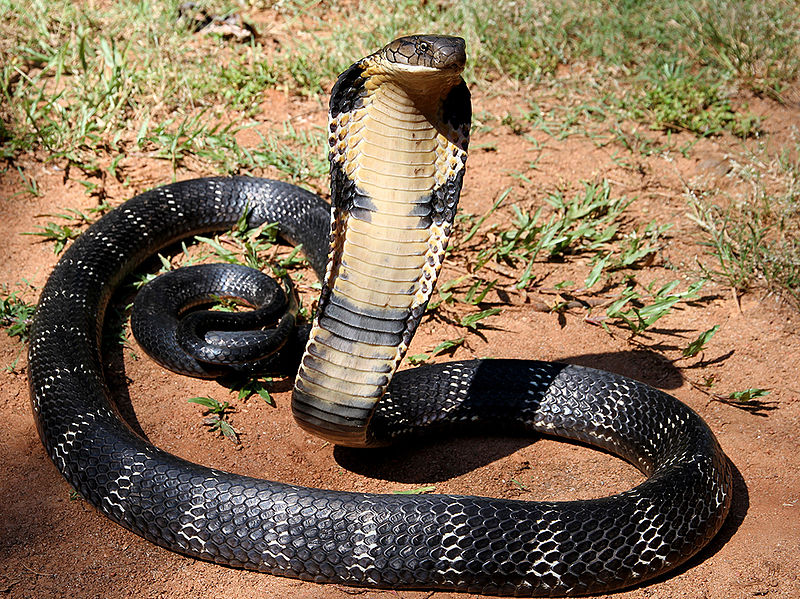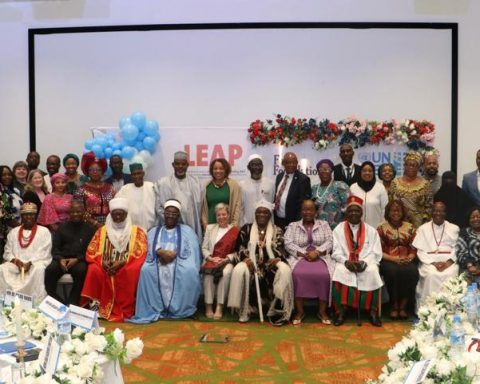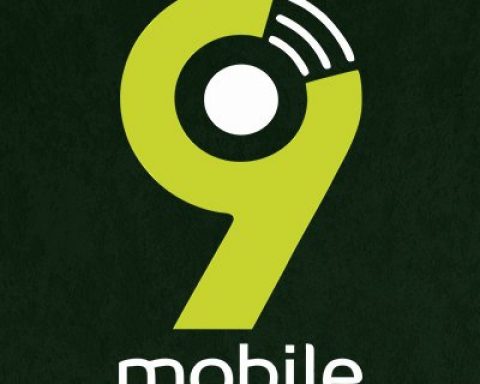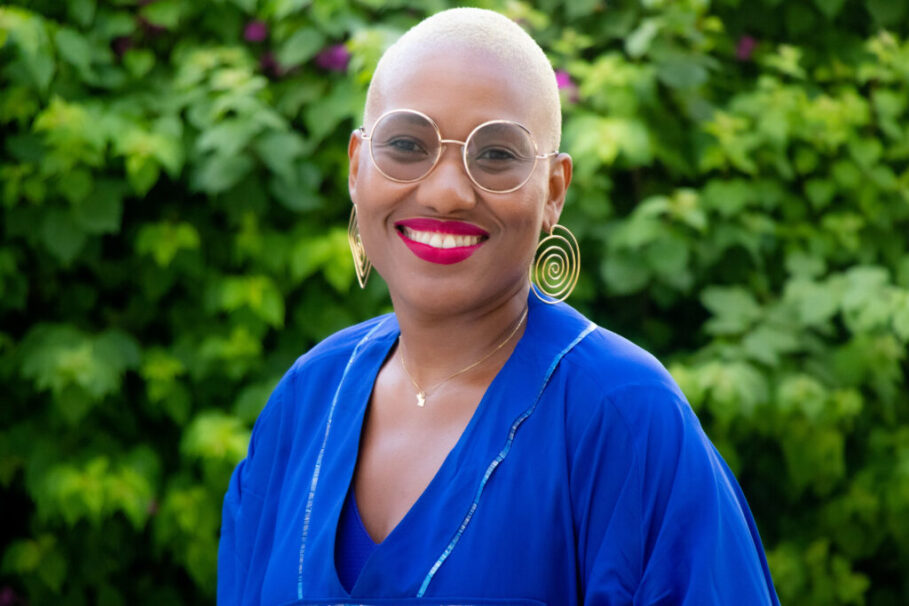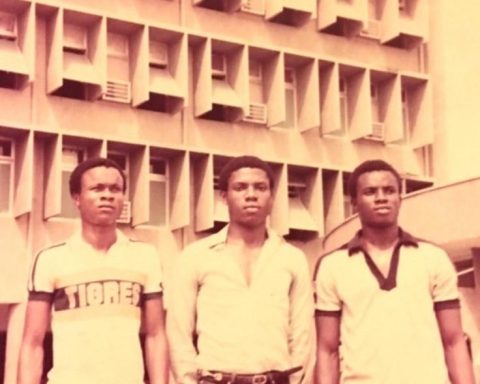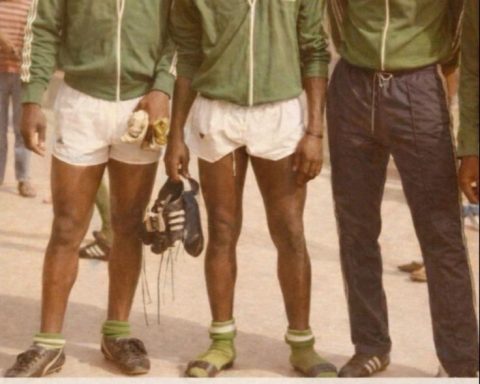It was a beautiful rainy evening in Ojoto, in Nigeria’s Southeast State of Anambra.
I was barely 10.
Join our WhatsApp ChannelGrandmother, Cecilia Ozoemena Mbamalu, had stepped out to gather some green leaves for her goats, which she had tended diligently for many years.
Having lost biological mother at 18 months, Nne (Grandma) was naturally the Mum I knew; and she left no room to miss ‘Mama’ as my older siblings referred to our late mother. So, as usual, I followed her to the bush – more like a yard behind our compound – to get some green plants and leaves for the goats, one of which belonged to me.
Then the rattled crow of the cocks, the scampering hens and their chicks drew my grandmother’s attention to a lurking danger – an angry looking long cobra near an Ukwa tree is set for a brawl with the chickens.
On sighting ‘Nne’ (a popular name used by many rural dwellers for grandmas in the area), the snake stood on its long tail and charged – a wonder to the little mind of a Primary 5 pupil. Inexplicably, I stood gazing as Nne courageously charged back with the machete in her trembling hands. She was clearly above 70 at the time.
Within a split of a second, the demon snake struck. I saw a lightening movement, a sparkling near-white liquid towards Nne’s face. It was the snake’s venom. And then, the old woman shouted: ‘It’s cold water in my eyes ooo,” and the machete dropped off her right hand.
Few seconds after, her scream got even louder: “No, it’s hot…hot …very hot.”
While my frightened mind was still struggling to process the entire thing, the snake turned right back into the bush. Nne, with one hand on her face, quickly picked up the machete with the other and dashed after the poisonous monster.
I couldn’t run, I just stood trembling and shouting on Nne to abandon the obviously dangerous chase of the little Satan under rain-soaked shrubs and canopy of green leaves.
Two minutes later, I saw Nne emerge from the bush with the head of the snake, a round black object dripping with blood. It was the little demon’s head. Nne made it; she killed the snake!
I got confused the more. How did she do that?
Then more shocks, as Nne collapsed after wrapping the snake’s head in green leaves. At this point, I had no choice but to run back to the house as her eyes remained shut.
I couldn’t get immediate help. ‘Papa’, my father, was out of town and state on usual business trip and Grandpa, Nnaa, was bedridden with stroke; Nne was Nnaa’s hands and legs. He muttered some frustration at my lamentation but could not raise a finger to help.
Racing up and down the large compound in confusion (I was too scared to return to the scene of the attack without a solution), an idea finally struck me: Neighbours could actually offer some help. So, I ran out of the compound to seek external support.
By the time I returned to the compound with a few neighbours, Nne was still on the ground. Though conscious, she couldn’t open her eyes, which got hotter and hotter each time she tried to open them. My confused examination could only observe deep red balls each time she attempted to open her eyes, a condition she suffered for the next 24 hours before she was taken to Uncle Mathias, her third son, in Benin. Uncle Mathias was, at the time, manager at the then Barclays Bank in Benin City, 200 kilometres away from ancestral home. Nne had to spend months at a hospital in Benin.
She returned home afterwards with both eyes normal.
“Why did you risk your life to kill the snake after it spat into your eyes, rather than run away to treat your hurting eyes?,” I asked upon her return from Benin.
“Nnaa”, (meaning my father, as she often fondly referred to me), “Okuko kpo nwa adighi akpa ote aka. (the hen with chicks does not run far in the face of danger). I saw the snake as danger to you and the entire household; it could crawl back into the compound at night. You would never have had the courage to enter that bush again if I did not kill the dangerous snake in your presence,” she told me.
Then she told me about her late mother who, according to her, also did some heroic deeds, including felling big trees which men could not do.
“Nnaa, we will still go into that bush together again to get leaves for our goats today,” She said, beaming a reassuring smile and ending the mother-child conversation abruptly.
READ ALSO: International Women’s Day 2023: Powerful Women Who Made Our ‘Front Page’
Teaching Discipline Through Animal Domestication
The protection and care she gave her goats – about five of them at the time – often agitated my little mind. Just that it’s in no way comparable to the massive love and support she gave her grandchildren and everyone around her.
Nne’s goats must eat twice a day, and my older siblings and I had the routine job of ensuring that they’re well-fed according to the decreed roaster we religiously kept for our own good.
Like Grandpa ‘Nnaa” before he succumbed to stroke, “Nne”, as we generally called grandma, hardly spanked us, but her rare angry shouts was enough punishment for any serious offence of which there was a clear short list: You must not forget to say ‘good morning’ to anyone older than you when you wake up; you must not forget to sweep your own portion of the compound and pack the debris clean before taking your breakfast or going to school.
Top on the list is the fact that the herd of goats or sheep must not go hungry; you must not forget to gather leaves for the goats and take the sheep out for grazing. On that score, Nne ‘rhymed’ with Nnaa and Papa, except that the latter would speak with a cane slightly longer than your height and stronger than the age of your bones.
We, therefore, made our own rules: To avoid Papa’s cane, we dared not allow Nne escalate our matter to Papa or let him conclude by himself that we erred on any of the above offences a third time!
Of course, the bleating of the goats was enough alarm to alert us to the fact that it was time for their breakfast or dinner. We had local names for different kinds of herbs and getting a particular fine broad-leafed and soft plant they liked so much was a thing of pride for us and great delight for the animals.
As children, we simply nicknamed the plant “goat rice”, probably because, in our little minds, the best food at the time was rice, which we sparingly ate only on Sundays unless it was Christmas, Easter or the yearly traditional New Yam Festival.
You could see the goats dance as you brandish “goat rice” leaves through the door of their pen – an outdoor small enclosure where grandma kept the animals.
The same goes for the sheep, which Nnaa also kept through our services. There seemed to have been an unwritten law that the herd of goats must have at least one he-goat to ensure the females kept reproducing; the same for the sheep. Unless they became strong enough to overthrow the alpha male, all other he-goats or rams are sold off at Nkwo Nnobi, a popular market in Anambra State. It took a day’s journey by foot to and fro the Nkwo Nnobi market to sell any of those animals.
In an average Igbo home in those days, old men tended sheep while their wives kept the goats. Just as the goats must not be hungry, the sheep were also kept well, except that they had to be taken out in the morning and left in the bush to graze. The leash was usually long to ensure that the radius of the sheep’s movement was wide enough to ensure access to food and avoid strangulation..
Of course, it was my duty to return them in the evenings and forgetting to do so or bringing them home late at night was almost a capital offence depending on grandpa’s mood.
Although my siblings and I owned at least one goat each and proudly paid attention to them, the real owner of the goat would always be unveiled each time there was reason to sell an animal – either for old age or sickness. Of course, we were not disillusioned in so far as Nne remembered to buy our balls of Akara (bean cake) from Nkwo Nnobi Market. She would not forget to disclose that the akara we ate were bought with the money procured from the sale of our goat. This sale probably occurs once in two years.
As the world celebrates the International Women’s Day on March 8, I cannot but remember late Grandma Nne Nwaozo, also known as Ezeoyibo. She was strong, loving and committed to family and society.
Nne Nwa Ozo, as she was fondly called, joined her ancestors in heaven on December 23, 1992.
Although from the ‘cradle’ she gave me a very good reason to respect women as real builders of character and society, my wife, Blessing, my wonderful daughters, loving sisters and friends have given me even much more impetus to celebrate women in Nigeria and the rest of Africa today.
Congrats to the real pillars! #EmbraceEquity.
Dr Marcel Mbamalu, a journalist, lives in Lagos. Events in this true life story occurred in April 1980 and written on March 8, 2023 in commemoration of International Women’s Day (IWD).


